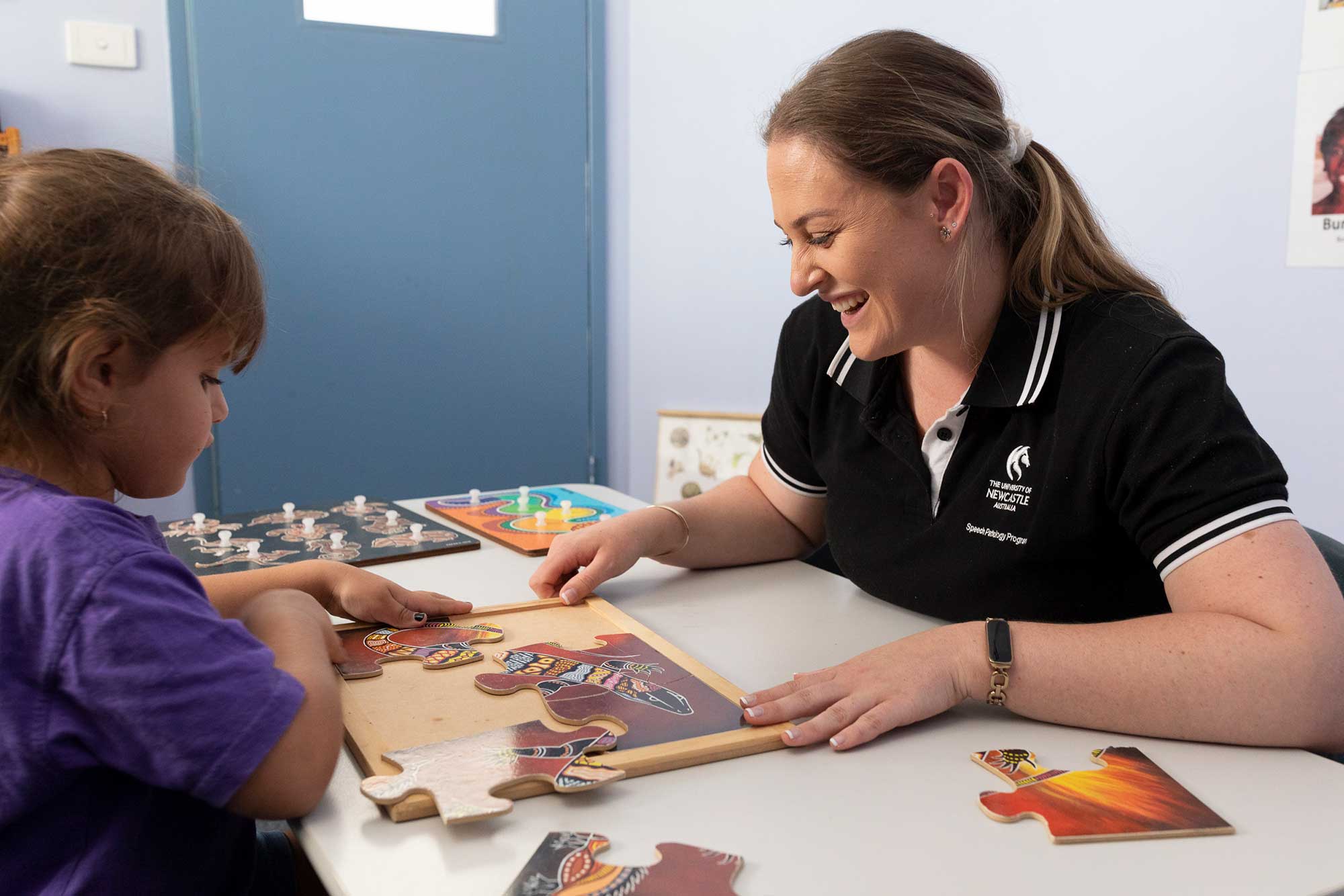
Speech Pathology Clinic
The University of Newcastle offers a student-led speech pathology (SP) clinic for children, young people and adults. SP students work with children and adults to develop programs specific to their needs helping them to reach their full potential with communication in all environments.

On-campus speech pathology clinics
We provide clinic-based services for children and adults who have concerns in the areas of stuttering and/or voice. We provide assessment, therapy groups and individual therapy sessions. We also offer services for University of Newcastle students and staff in the area of speech intelligibility. The speech pathology clinic is located on the ground floor of the Social Sciences (SR) Building at the University of Newcastle. It includes the following clinics:
Stuttering Clinic
The University of Newcastle Stuttering Clinic offers assessment and treatment to children, adolescents and adults who stutter. The clinic provides clinical education to speech pathology students under the guidance of experienced speech pathologists.
Assessment
The University of Newcastle Stuttering Clinic provides free stuttering assessments for all age groups.
Treatment Programs
Therapy for stuttering is available for suitable pre-school and school aged children (suitability determined at time of initial assessment). The evidence-based therapy programs include the Lidcombe Program and Oakville Program. There is currently no cost for this service.
Intensive treatment programs are available for high school aged children (aged 12+), adolescents and adults who stutter. All intensive programs involve one week of intensive therapy, and 5 two-hour fortnightly follow-up sessions. A fee is charged for this service.
Referrals
Referrals to the Stuttering Clinic may be made by the individual, parents, or health care professionals.
Contact
For referral enquiries for children under 12 years of age contact Jessica Hassett.
Email: StutteringClinic@newcastle.edu.au
For referral enquiries for 12 years + contact Monica Anderson.
Email: Monica.anderson@newcastle.edu.au
Voice Clinic
Do you experience...
- Tension, strain or discomfort when speaking?
- Constant need to clear your throat?
- Persistent or dry cough?
- Lack of voice power?
- Loss of voice?
- Deterioration of your voice over the day?
- Breaks or sudden pitch changes in your voice?
If you experience any of these symptoms on a regular basis, you may have a voice disorder.
What can be done?
There are many things that can be done to reduce the chance of developing a problem with your voice.
You can maintain good vocal hygiene by:
- drinking plenty of water
- reducing caffeine intake
- reducing smoking
- avoiding yelling and straining your voice
- using microphone and FM systems when possible
- resting your voice when possible
A speech pathologist will:
- Take a detailed case history
- Conduct voice assessments that will help to determine the cause of your voice problem
- Make recommendations based on assessment results and evidence-based practice
- Provide therapy to alleviate symptoms
How to make an appointment?
If you think you may have a voice problem and feel you may benefit from a voice assessment and voice therapy, please contact the University of Newcastle Voice Clinic.
An Ear Nose and Throat (ENT) or a Respiratory review is required before therapy can be commenced. There is currently no cost for this service.
Email: voiceclinic@newcastle.edu.au
Speech Intelligibility Clinic
The Speech Intelligibility Clinic offers communication enhancement to individuals who are non-native speakers of English (NNSE).
Some NNSE find that others have difficulty understanding them in English because the sound system of their first language "interferes" with their English pronunciation.
Most languages are learnt through vocabulary and grammar with minimal focus on learning the sounds of a second language, how they are made and the difference between these sounds and those of your native language.
What we offer
We provide weekly group sessions supervised by a qualified Speech Pathologist in conjunction with Speech Pathology students.
We aim to provide you with an increased awareness of the differences between your speech pattern and a native English speaker's speech pattern.
Conversation practise in a supportive environment helps minimise breakdowns in communication. Training in conversation repair strategies for when breakdowns do occur will also be included. Feedback will be provided on your rate of speech, body language and intonation to enhance successful communication.
Benefits
- Promote confidence when you are speaking in English
- Increase your understanding and participation in academic activities
- Allow listeners to concentrate more on your message than on the delivery of your message
- Improve your employment prospects
How to make an appointment
There is currently no cost for this service.
Contact Monica Anderson.
Email: Monica.anderson@newcastle.edu.au
School-based programs
The Speech Pathology in Schools (SPinS) model of service delivery was developed in response to the dual needs of (1) appropriate service provision for school-aged children with communication difficulties and (2) provision of relevant school based clinical placements for speech pathology students.
The program works on a collaboration basis between class teachers, speech pathology students and a clinical educator. The students and educator attend the school one day per week over two school terms. Assessment and intervention take place via individual and group sessions and/or within the classroom as well as through providing teachers with classroom strategies.
Many of the children seen through the SPinS program have speech and/or language delays, and struggle to keep pace with literacy instruction. They are at risk of becoming disengaged with learning. Research tells us that children’s attitudes to school and how they see themselves as learners are formed within the first few months of school. Changing negative attitudes is not easy and it is difficult for young learners who fall behind their peers to ‘catch up’ in their academic achievements.
The SPinS model of service delivery is valuable because the program provides:
- assessment and management of school aged children with speech, language and literacy difficulties.
- experience for speech pathology students, not only in conducting assessments and therapy, but also in working with teachers and other school support staff.
If you are interested in applying to have the SPinS program in your school, please contact the Co-ordinator of SPinS: Annemarie Laurence. A fee is charged for this service.
The University of Newcastle acknowledges the traditional custodians of the lands within our footprint areas: Awabakal, Darkinjung, Biripai, Worimi, Wonnarua, and Eora Nations. We also pay respect to the wisdom of our Elders past and present.